MAPA Interview: The Alluring Eccentricity of a Group Often Compared to a Theatrical Performance
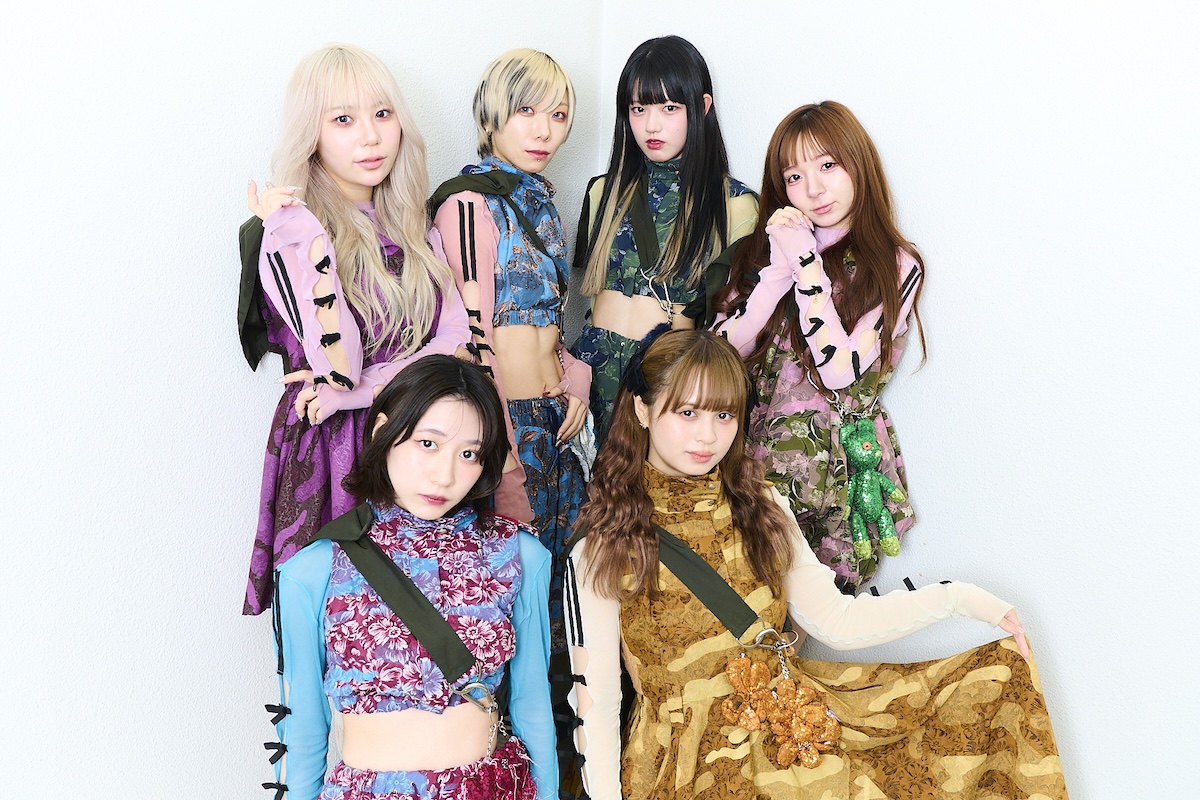
WACK, the Japanese music production company, will hold its sixth overseas event, WACK in the UK vol.6, on June 5 (Thu) and 6 (Fri), 2025, at The Underworld in London. The two-day event will feature performances from ASP, ExWHYZ, and MAMESHiBA NO TAiGUN on Day 1, followed by MAPA, PIGGS, and ZOCX+Karen Aizome on Day 2.
In this article, we present an exclusive interview with MAPA, who will be performing on Day 2. The group was formed around Coshoji Megumi—formerly known as Megumi Koshouji, a founding member of the first generation of BiS and a former member of Maison book girl, which disbanded in May 2021. MAPA is signed to TOKYO PINK, an agency run by Coshoji’s close friend, singer-songwriter Seiko Oomori, who also serves as the group’s producer.
The current lineup includes Coshoji Megumi, Ushiro Mayo, Shio Yusura, Jinzai Emu, Kurumi Touka, and Misaki Midoriyama. Known for their highly unique songs and performances, MAPA has earned a reputation as a group whose shows feel almost like theatrical productions. In this interview, we take a deep dive into what makes them so distinctive.
— To start off, could each of you introduce yourselves?
Coshoji Megumi: I’m Coshoji Megumi. I’m 160 cm tall, and my member colors are light blue and red. I have a pet dog named Ululu—she’s a Chiweenie—and today she didn’t finish her food (laughs). I recently dyed my hair to match her coat pattern! I also write a lot of the poetic lyrics for our songs.
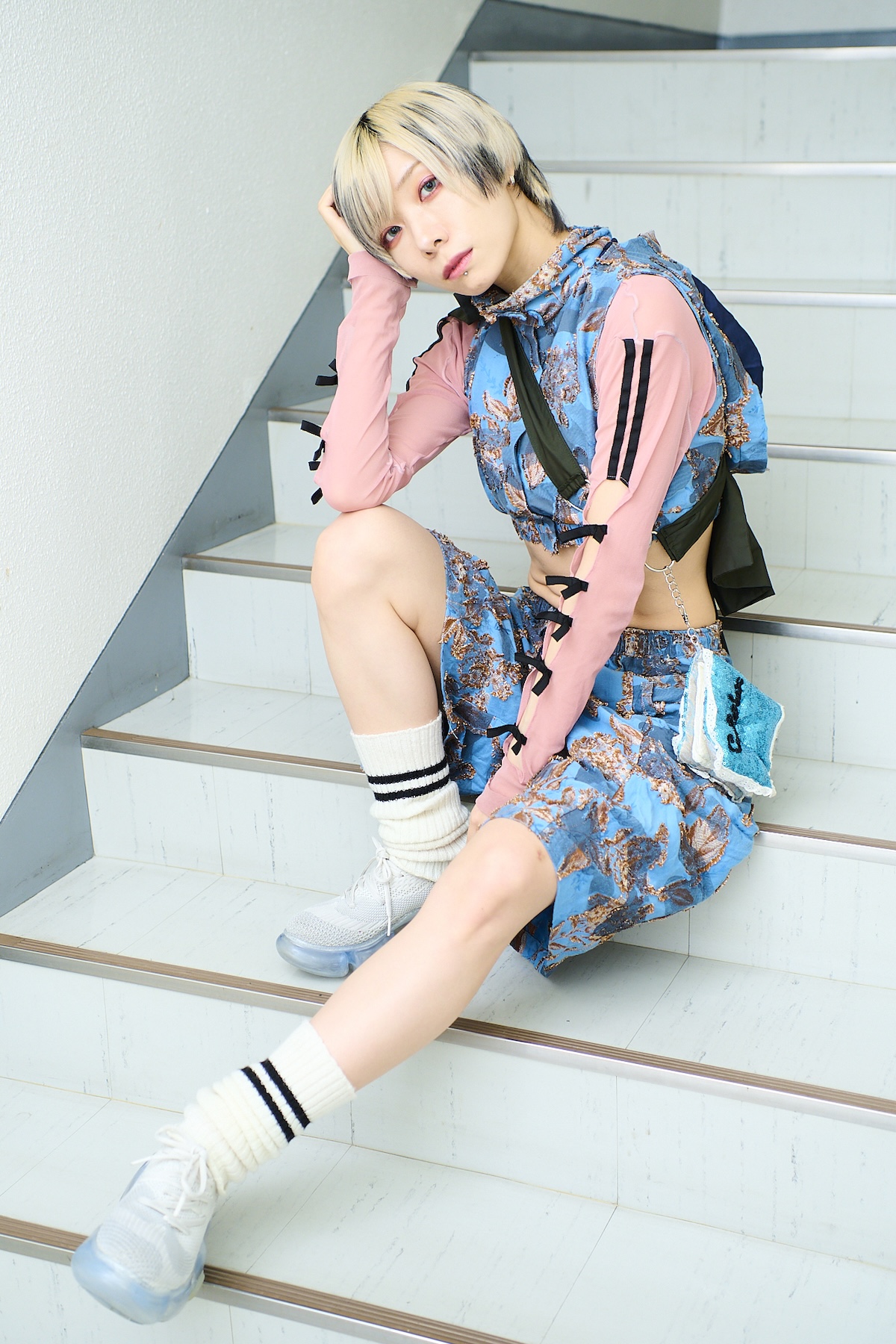
Coshoji Megumi
Jinzai Emu: I’m Jinzai Emu. My member colors are pink and green. I have two dogs—one’s a Shiba Inu and the other is an Italian Greyhound. My favorite character is Gloomy Bear. I’ve been attending international schools since I was a kid, so I can speak some English. Right now, I’m studying idol culture at university.
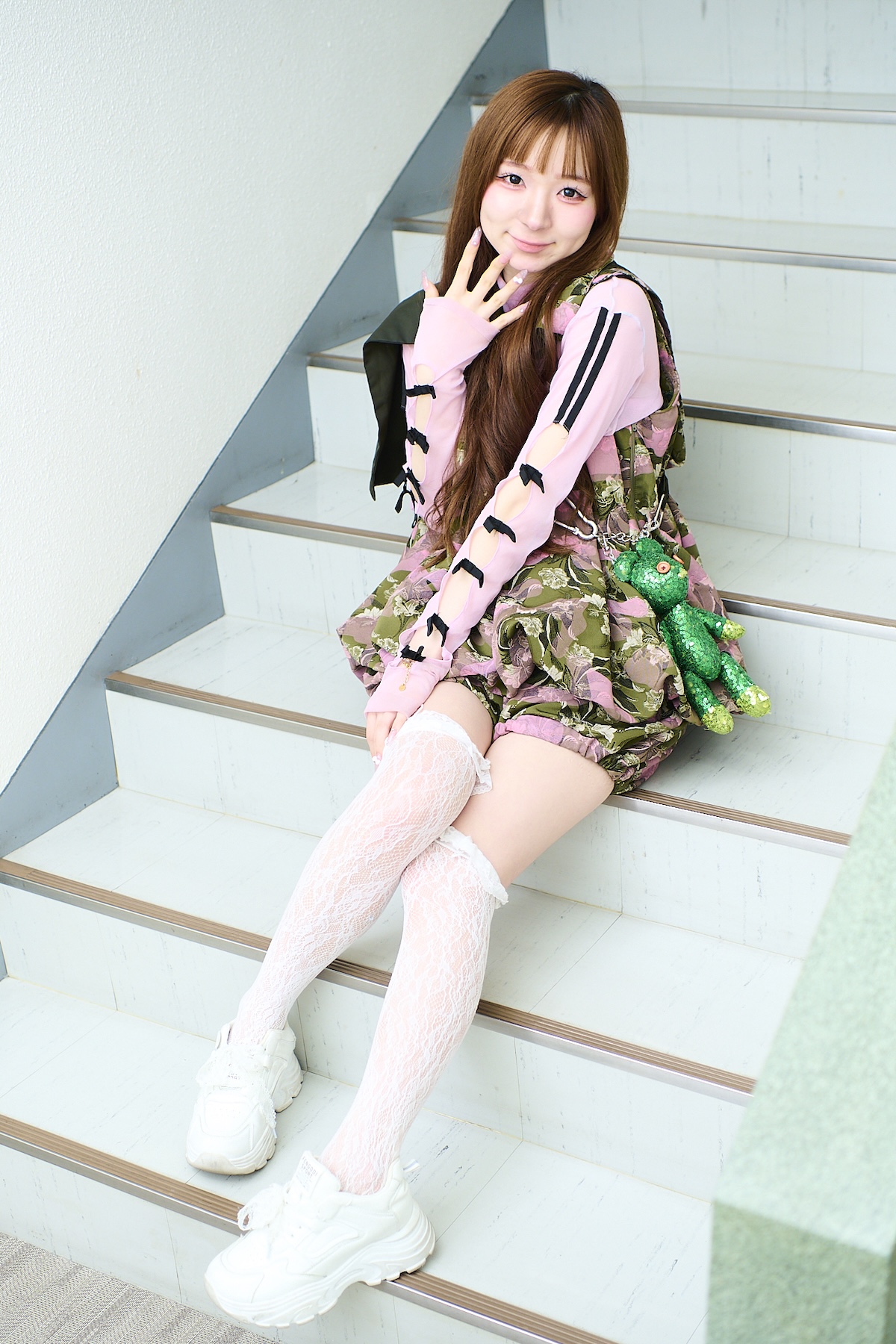
Jinzai Emu
Ushiro Mayo: I’m Ushiro Mayo. My member colors are orange and white. My mother is from another country, so technically I’m half, but I can’t really speak English (laughs). I’m better at understanding it when I hear it, so I think I could manage if I really tried. Out of all the members, I’m probably the easiest to schedule things with—I’m usually home and can head out as soon as someone calls me (laughs). I love burning incense and buying fresh flowers for my room every month. I’m pretty good at eyeballing the length and cutting them evenly. I enjoy that kind of “simple sensory” task. And I really love singing!
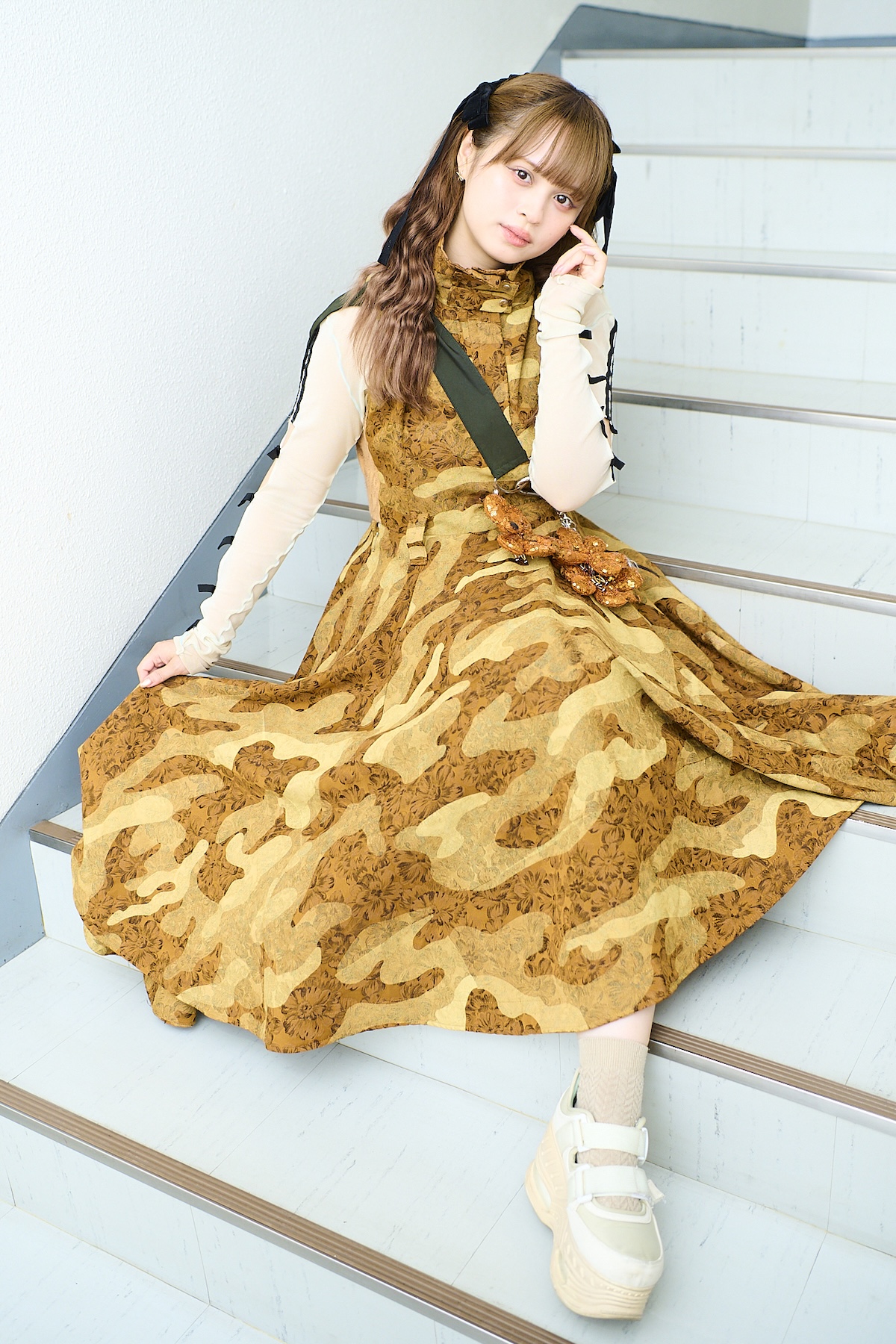
Ushiro Mayo
Shio Yusura: I’m Shio Yusura. My member colors are purple and yellow. I probably have the loudest voice in MAPA, so I often do the announcements when our fan events begin. Lately, I’ve been obsessed with Hong Kong movies. I’m really excited to go to the UK and can’t wait to eat all the local food! I love trying regional dishes, so I’d love to try fish and chips, herring pie, and anything else that’s distinctly British. To everyone reading this—if you have any food recommendations, please let me know!
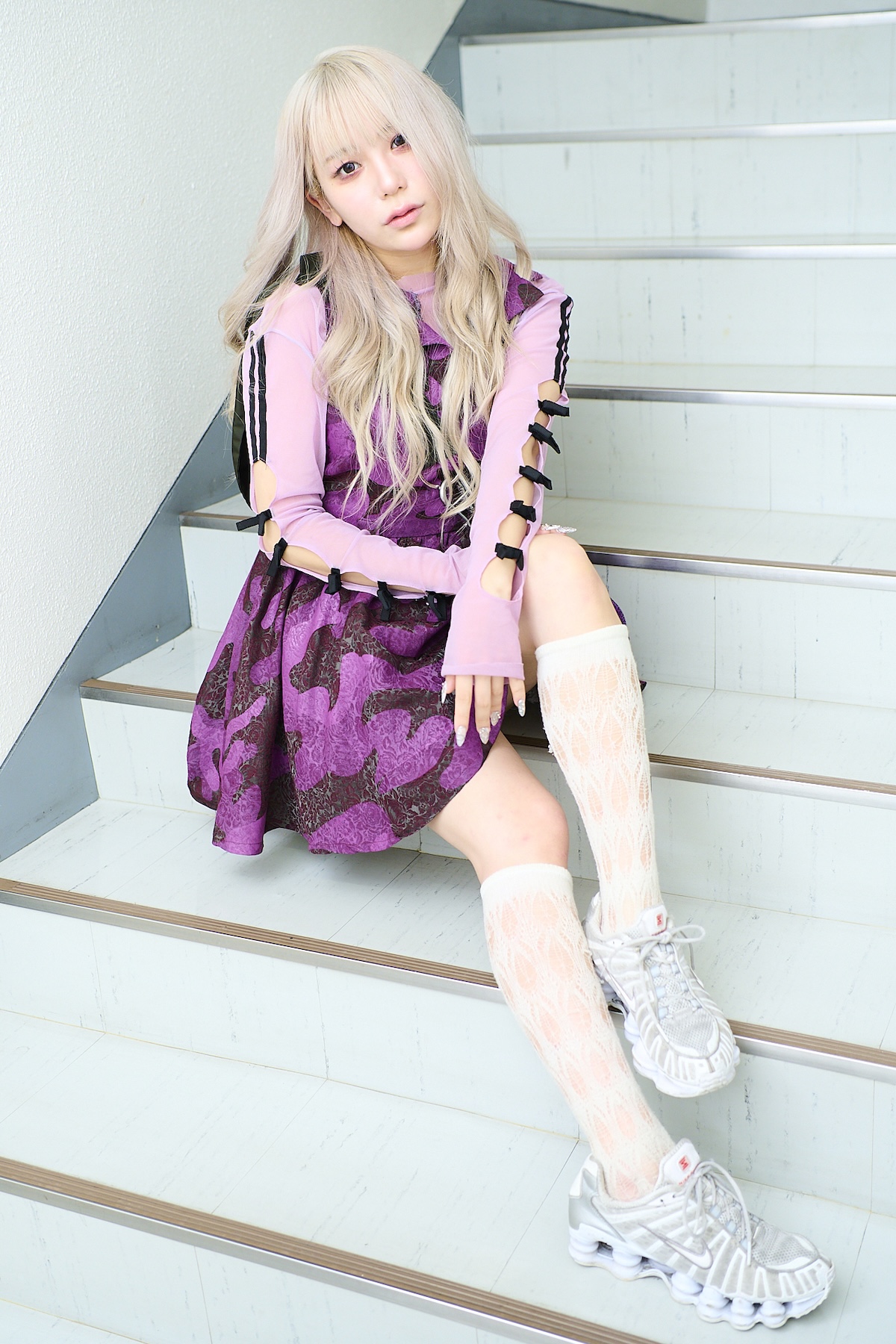
Shio Yusura
Kurumi Touka: I’m Kurumi Touka. I joined MAPA in January 2023. My member colors are navy and green flash. My favorite food is pickled plum (ume), and I’m the tallest member of the group. I love Doraemon and pandas, and my special skill is speaking using only vowels.
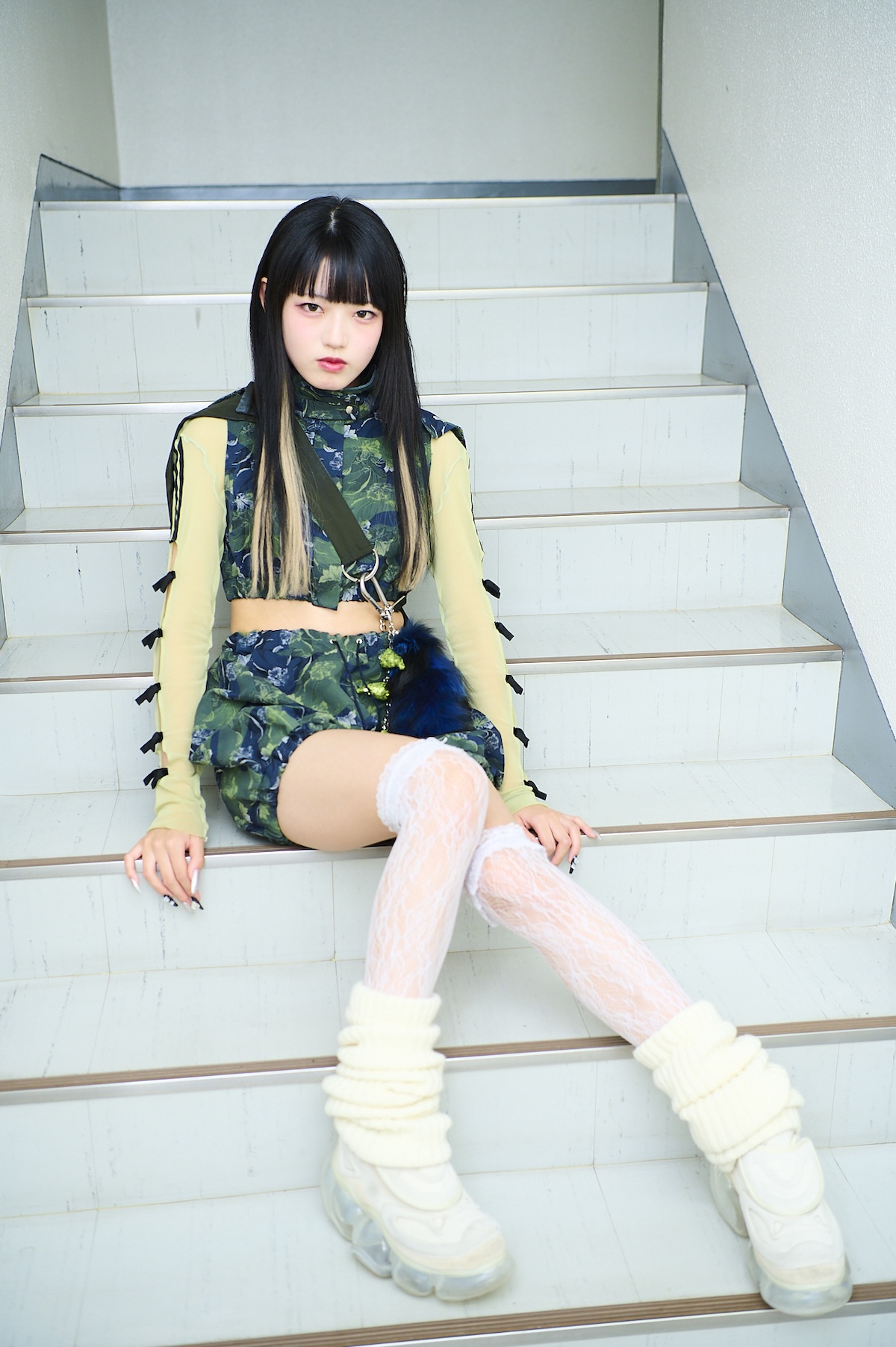
Kurumi Touka
Misaki Midoriyama: I’m Misaki Midoriyama. I joined MAPA in January 2023, just like Kurumi. I’m 150 cm tall, and I have a pet bearded dragon. My member colors are peacock blue and magenta. I love drinking alcohol, and recently I’ve been really into knitting. I’ve made hats, headdresses, and even a coaster the other day!

Misaki Midoriyama
— Interesting! Each of you has two member colors. Most idol groups usually assign just one per person. Why does MAPA go with two?
Coshoji: Because it’s cuter that way (laughs). If our outfits were just one color, they might look a bit plain. But with two, there’s a kind of added charm—and it makes things more visually fun too.
— What’s the meaning or origin behind the name “MAPA”?
Coshoji: Originally, the group wasn’t going to be called MAPA—it was supposed to be “MADPARTY.” I happened to be really into Pokémon cards at the time, and there’s a move called “Mad Party.” The more cards you have with that move, the stronger the attack. I thought that idea was fun, so I sent a few name suggestions to Seiko Oomori, our producer. At first, it looked like “MADPARTY” was going to be the final choice. But when we were set to perform at TIF (Tokyo Idol Festival), we noticed on the timetable that the name “MADPARTY” kind of got lost among the other group names—it was a bit long and harder to spot. We thought, “Hmm, this might not stand out enough,” and that’s how we ended up going with “MAPA.”
— Do you have a name for your fans, like an official fandom name?
Ushiro: Actually… we don’t (laughs). There was a time when we thought about creating one. We had a bunch of wild ideas—like “Hadaka-zoku” (which literally means “the Naked Tribe”) and so on (laughs).
Shio: Yeah, I remember that! There were definitely discussions. But for one reason or another, nothing really stuck, and here we are, still without a fan name.
— That’s pretty unique, especially since most idol groups nowadays launch with a fandom name already decided.
Ushiro: Yeah, we kind of just… kept going without one (laughs).
— Emu, you mentioned earlier that you’re studying idol culture at university. Do you think MAPA occupies a unique position within Japanese idol culture?
Jinzai: Definitely. MAPA’s songs don’t necessarily express emotions that are universally relatable—they tend to focus on what’s going on inside, more internal stuff. So it’s not like you instantly go, “I get it!” That makes me really curious about how international audiences will respond to our music when we perform overseas.
— Have you noticed any ways MAPA feels different from other groups through your own experience?
Jinzai: The overall vibe is totally different. And I think that unique atmosphere is what really resonates with the people who support us—they tend to stick around. While aiming for clarity and mass appeal is one way to go, I feel like leaning into our more edgy, distinctive side allows us to offer something truly MAPA. I’ve come to think that it’s okay to just keep doing what we’re doing.
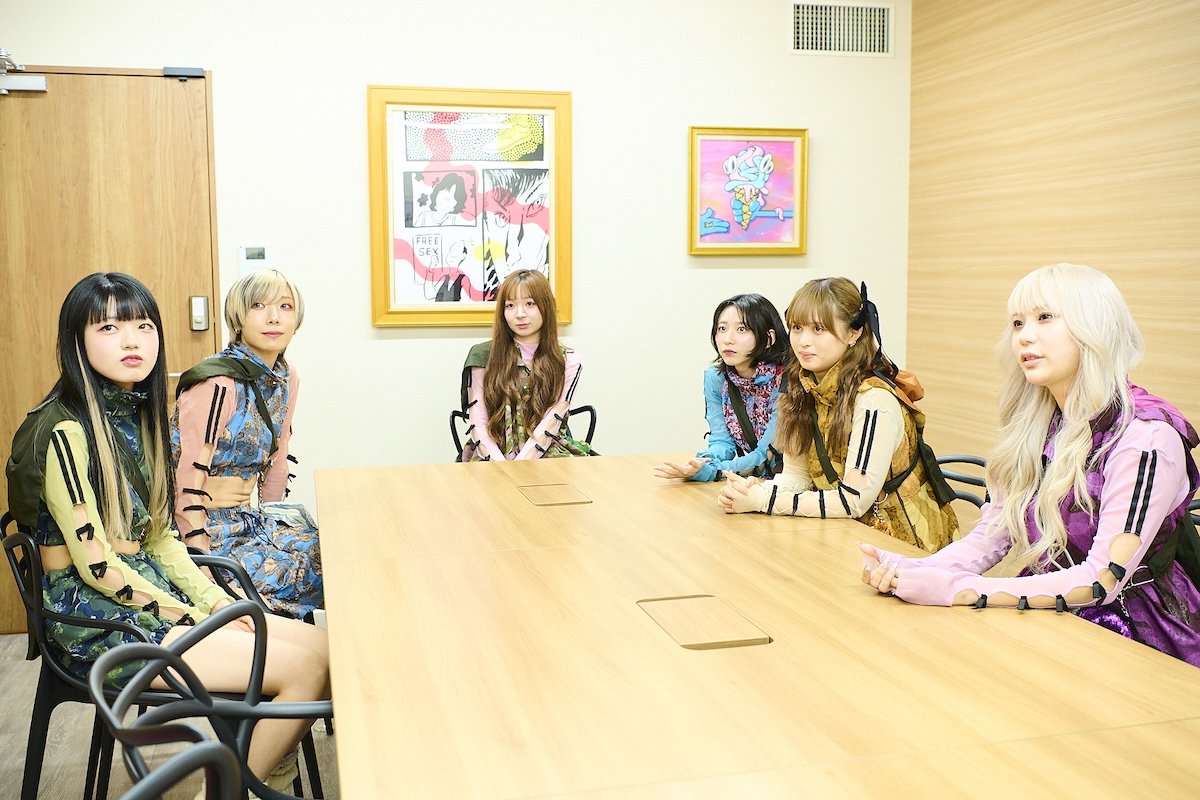
Kurumi, Coshoji, Jinzai, Misaki, Ushiro, Shio
— Kurumi and Misaki, you both joined the group later on. What were your impressions of MAPA before joining?
Kurumi: To be honest, I didn’t know a whole lot about MAPA before I joined. I was following Coshoji-san on social media, and that’s how I first came across the group. Instead of being the typical “cute idol” type, they struck me as stylish and very unique in terms of atmosphere. What stood out the most at first was how not cutesy they were. That gave them a really cool and sophisticated vibe.
Misaki: I also found out about MAPA when I heard that Coshoji-san was starting a new group. What immediately set them apart for me was how little call-and-response there was with the audience. In most idol groups, interacting with fans during the live shows is part of the charm. But MAPA performances are more like something you sit down and watch closely, almost like a stage play. Fans often tell us, “It feels like watching a theater performance.” That alone gives MAPA a totally different presence from other idol groups.
— Was that direction something you intentionally aimed for from the beginning?
Coshoji: I don’t think the overall direction has changed much since the start. The vibe of our live shows has remained pretty consistent from the beginning.
Ushiro: It’s not like we ever made a conscious decision to change things. We debuted as a four-member group with an album, and from there, it just kind of evolved naturally. For example, Coshoji’s poetic verses have become more prominent in the music, and whereas we used to move in sync during performances, now each of us often moves differently. So while the core of what we’re doing hasn’t changed, the shape of MAPA as a group has become more defined over time. That’s how it feels to me.
— How about you, Shio? Do you feel the group has evolved over time through continued activity?
Shio: Definitely. When we became a six-member group last January, I felt a big shift within myself. I’ve always loved MAPA’s musical style, but when it came to embodying that music on stage, I often felt like I was lacking something or wished I could do more. But since we became six, I’ve had more and more moments where I thought, “If I present it this way, it might come across even better.” Earlier this year, we had the chance to do a solo show at a concert hall, and after that, fans and people in the industry started saying things like, “MAPA’s stage presence has changed in a really good way.” Hearing that made me realize that MAPA truly is evolving as a six-member group.
— So adding more members expanded your ability to express different things on stage.
Shio: Exactly. It’s not just that having more members makes the group feel “flashier”—it actually brought more diversity to both the visual and sonic elements of our performances.
— Emu, what do you think, hearing all of this?
Jinzai: I really feel like I’ve “grown alongside MAPA.” Like Shio just said, it’s hard to embody something. In the beginning, I honestly don’t think I was able to fully express MAPA’s songs or worldview. The group’s vibe is different from what’s trendy, so I was always trying to figure out how to communicate that effectively. But as I spent more time with the group and reflected on it, I started to understand what MAPA was all about. That’s when I realized, “This group is something truly special.”
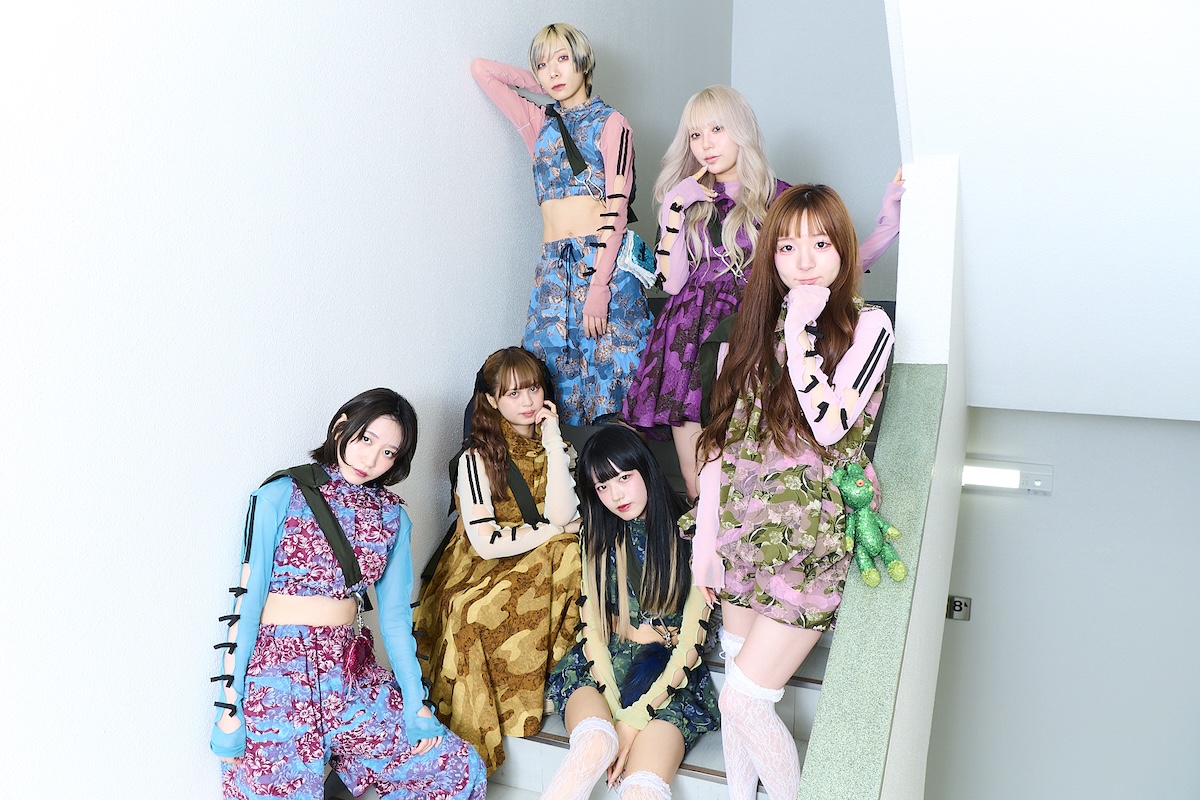
— Including poetry in idol songs is pretty rare in Japan. Was that always part of your vision, Coshoji?
Coshoji: I wouldn’t say I had a super clear plan like, “It has to be this way.” But I did have a vague image in my mind of what kind of idol group I wanted to create. Above all, our songs are produced by Seiko Oomori, and I’ve always hoped to merge her worldview with my own perspective in a meaningful way. If I were to leave everything up to someone else, I’d feel like I didn’t have a reason to be here. But if I bring my own perspective to the table, maybe Oomori-san will create something new in response to it. That kind of mutual interaction is really important to me. And I think all the members feel the same way. The lyrics Oomori writes always seem to fit each of us personally, as if they were written just for us.
— MAPA is signed to the agency TOKYO PINK, which is led by your producer Seiko Oomori. What kind of presence does she have in your lives?
Shio: Oomori-san is such a powerful performer—she radiates energy from head to toe. Whenever we do agency-wide live events, I often find myself inspired just by watching her from behind. She naturally makes you want to push yourself harder. Oh, and she recently asked me out of the blue, “Wanna go to Disneyland?” We ended up going together for two hours (laughs). Even though she’s our company president, she’s so down-to-earth. That kind of closeness is part of what makes her so appealing.
Ushiro: Even though TOKYO PINK was created by Seiko Oomori, I feel like MAPA has a slightly different vibe compared to the other groups. Even from the inside, I often think, “Yeah, we’re kind of the odd ones out.” Watching Oomori-san perform up close at company shows is incredibly educational and inspiring. Personally, I care a lot about improving my skills, and this agency provides an environment where I can keep learning—that’s something I’m really grateful for.
Misaki: Seiko Oomori’s music often symbolizes a kind of “Japanese girlishness.” But when Coshoji adds her own lyrics and helps shape the group’s aesthetic, it creates a different kind of musical approach. That’s why even though we’re part of TOKYO PINK, people are often surprised and ask, “Wait, MAPA is produced by Seiko Oomori?” But when we perform alongside other groups at agency shows, you can really see how her songs take on completely different forms with each group. I’m constantly amazed by her range of expression, and I feel incredibly lucky to be working in that kind of environment.
— What about you, Emu?
Jinzai: Everyone’s already said it so perfectly that there’s not much left to add (laughs). Honestly, I didn’t know much about Seiko Oomori when I first joined, but the more I got to know her, the more I fell in love with her music. I’m especially drawn to the way she portrays a uniquely Japanese kind of femininity. Being part of that kind of musical expression means a lot to me.
Coshoji: Like Misaki said, it’d be really cool if people discovered TOKYO PINK and Seiko Oomori through MAPA. That kind of reverse exposure is exciting to think about. Recently, I had a conversation with Pour Lui from PIGGS and Oomori-san, and she told us, “Usually I’m the one in charge of a group or company, so it’s refreshing to just talk like equals.” That really stuck with me—it made me realize that when she’s with me, she’s not necessarily “Seiko Oomori the producer,” but just a fellow artist being totally herself. I think it’s meaningful that we’ll be performing in London together—MAPA, PIGGS, and Oomori-san. Taking this dynamic overseas feels like a chance to present a new kind of relationship and a new way of being seen.
Kurumi: Seiko Oomori’s songs have gone viral on TikTok so many times that even if people don’t know her name, they’ve probably heard her music somewhere. I think it’s amazing that she continues to create music that resonates with people like that. She balances being an active solo artist, working with ZOCX, and then casually inviting us to Disneyland—that freedom and authenticity is incredibly inspiring. Watching her perform always makes me want to try harder. Being in the same agency as someone like that is a huge honor. Like everyone’s said, I think MAPA is a really unique group, even within TOKYO PINK. There’s nothing else quite like us, even globally. That’s why I’m so excited for people in the UK to experience what MAPA is all about.
— For people who are just discovering MAPA, could each of you recommend a song to start with?
Ushiro: It’s hard to choose just one… but recently, I finally told my mother—who’s from another country—that I’m part of MAPA. I showed her our YouTube channel, and the song she really liked was “Shitenno” (“The Four Heavenly Kings”). It’s from our first album, and it has this repeated line, “Grandpa, Grandma,” which really stuck with her. She found it funny and catchy—and even my grandparents ended up laughing! (laughs) Of course, one person’s opinion doesn’t speak for everyone, but that moment made me realize this song might connect well with international listeners too.
Shio: I’d go with “Kaiju GIGA.” It’s definitely one of MAPA’s must-hear tracks. The lyrics might be a little tricky for overseas fans to fully grasp, but the chorus is super catchy—it goes, “Gwaaooh! Gwaaooh! I’ve come to pick you up!” Even if you don’t understand every word, it’s a song you can totally get into and enjoy together with us. Definitely give it a listen!
Misaki: My pick is “Zettai Unmei Gokko” (“Fated Make-Believe”). It was the first music video we released after becoming a six-member group, and I think it really captures what MAPA is today. The video is on YouTube, so I’d recommend starting with that to get a feel for us.
Kurumi: It’s a tough choice, but I’d say “Calling box.” We perform it live often, and as soon as the intro starts, it instantly pulls you into the world of MAPA. I personally love performing it on stage. I’d be happy if people could watch it with the visuals too—it’s a powerful experience.
Jinzai: I also love “Shitenno,” but if I were to pick another, I’d recommend “Love-Pi”. In this song, we dance in a “para para” style, which is rooted in Japanese gyaru (gal) culture. I think that kind of energy would really resonate with international audiences. It’s not just idol music—it’s a glimpse into a fun and quirky side of Japanese youth culture, and I’d love for people to enjoy it from that angle too.
Coshoji: My choice is “Aidoru wo Yameru Hi (The Day I Quit Being an Idol)”. The lyrics are pretty dense, so it might be hard to understand everything, but it’s a song where we convey the message through our facial expressions, eye contact, and emotion during live performances. Despite the title, the song isn’t only about quitting idols—everyone has moments in life when they end something or begin something new. That’s why I think it’s a song many people can relate to, no matter where they’re from. I really hope more people get to know it.
— MAPA is about to perform overseas for the very first time, with a special show in London. What kind of concert do you hope to deliver, and what are your personal thoughts as you prepare for this big moment?
Kurumi: This will actually be my first time traveling abroad, so I’m really nervous! But more than anything, I’m excited to share the version of MAPA that I think is cool with people outside Japan. I hope this show can be a chance for more people to discover MAPA. Lately, I’ve even been listening to the UK charts to get in the mood for it (laughs).
Misakia: It’ll be my first time abroad too, and honestly, I still can’t fully imagine what it’s going to be like. But I’m really looking forward to seeing how our music—especially with the poetry parts—comes across to an audience that doesn’t share our language. It makes me so happy to be bringing MAPA’s music to a place where people might receive it with open hearts. I’ll give it everything I’ve got!
Shio: I’m feeling a mix of excitement and nerves. But I believe that the people who come to our London show are going to be the kind of fans who are genuinely passionate about Japanese music and idol culture. I want to give a performance that matches that level of enthusiasm. I’ve also started studying English to prepare for our fan meet—I’ve been following two English-teaching accounts on Instagram and trying my best! (laughs)
Ushiro: For some reason, I’ve always had this unshakable feeling that “MAPA will resonate overseas!” I believe music can transcend language barriers, and that’s why I want to deliver an honest, sincere performance—something that’s raw and real. I’m studying English too, so I hope I can have at least a little conversation at the fan meet. Please come see us!
Jinzai: Being able to perform overseas as a Japanese idol group is such an honor. That title carries weight, and I want to carry it with care and responsibility. We’ll be performing a solo show, not part of a festival—so the people coming to see us have looked us up, found out about us, and decided to come. That means a lot. I want to stand on that stage with full gratitude—for everyone who’s paved the way before us—and give everything I have as a member of MAPA.
Coshoji: I’ve performed in the UK once before with a different group, and what stood out to me then was how deeply some international fans understand idol culture. I felt like they were watching us with real intention and curiosity. That’s why I want MAPA to meet that same level of sincerity, head-on. This will be our first-ever overseas performance—and we only have one shot at it. The fact that we get to share this one moment with people in London feels almost like a miracle. I’m sure it’ll bring fresh inspiration, and I want to carry that energy back with me and reflect it on our tour in Japan starting this June. I’m heading into this show ready to give it my all, with nothing but myself to rely on. I know there will be people coming from Japan, from London, and from other countries too—and I hope this becomes a special time for everyone. I’m really looking forward to meeting you all.
INTERVIEW:Hiroo Nishizawa
Photo:Yuuki Ohashi
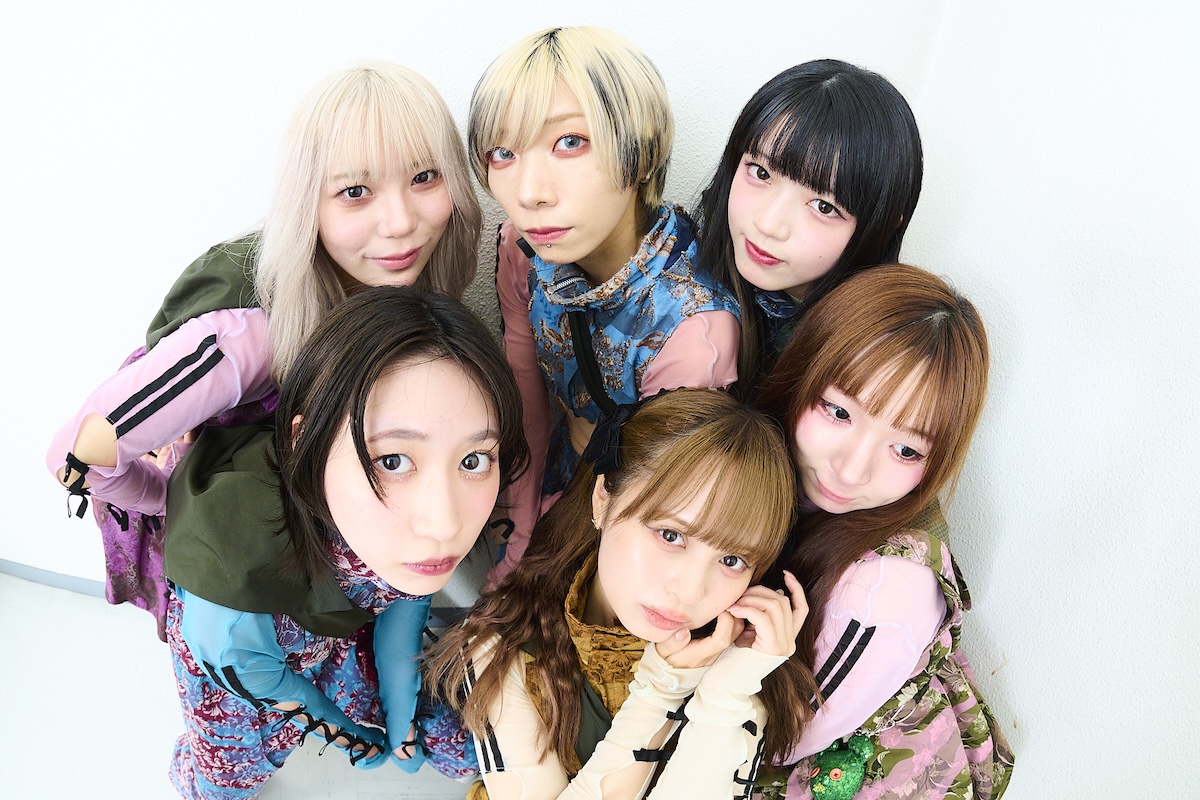
■ LIVE Info
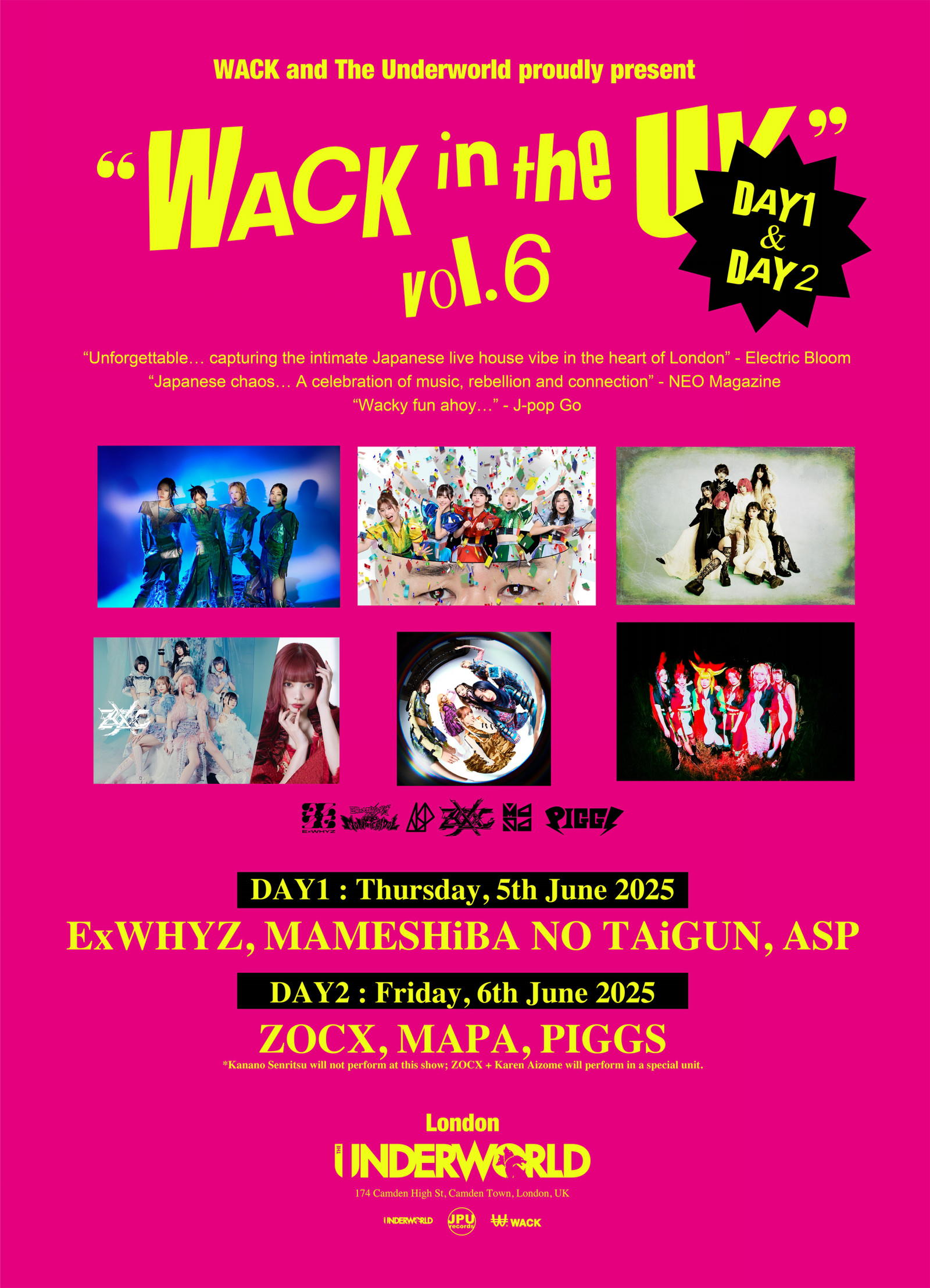
WACK in the U.K. Vol. 6 DAY1&DAY2
DATE: DAY1-Thursday June 5 / DAY2- Friday June 6 2025
OPEN: 7PM (DAY1&DAY2)
VENUE: The Underworld (London)
APPEARANCE :
DAY1 – Thursday June 5 : MAMESHIBA NO TAIGUN, ASP, ExWHYZ
DAY2 – Friday June 6 : MAPA, PIGGS, ZOCX
*Kanano Senritsu will not perform at this show; ZOCX + Karen Aizome will perform in a special formation.
General Tickets: £30 (Entry from 7pm)
VIP Upgrade Ticket: £120 – strictly limited. It includes:
· Light lunch with the members
· Cheki photo with group of choice
· Cheki photo with member of choice (plus autograph)
· Exclusive T-shirt (Japanese XL size)
· Early entry to the show.
· VIP ticket holders do not need to purchase a general entry ticket.
To upgrade via DICE please purchase a general ticket, then log into your DICE account and choose the upgrade option.
Day one: The tickets will go on sale at noon (12:00 PM) London time on March 29.
Day two:The tickets will go on sale at noon (12:00 PM) London time on March 29.
Day one: https://link.dice.fm/4OqyaX4f4Rb?sharer_id=6560e9e76f7c080001787c1e
Day two: https://link.dice.fm/sfNHad8f4Rb?sharer_id=6560e9e76f7c080001787c1e
————-
Timetable:
DAY1 – Thursday June 5
12:30 – VIP light lunch and cheki event
14:00 – Cheki ticket sale begins for general ticket holders.
14:30 – General cheki event
18:30 – VIP early entry
19:00 – General entry
19:30 – MAMESHIBA NO TAIGUN
20:20 – ASP
21:10 – ExWHYZ
22:00 – End
DAY2 – Friday June 6
12:30 – VIP light lunch and cheki event
14:00 – Cheki ticket sale begins for general ticket holders.
14:30 – General cheki event
18:30 – VIP early entry
19:00 – General entry
19:30 – MAPA
20:20 – PIGGS
21:10 – ZOCX
22:00 – End
About Cheki event:
Cheki are a type of polaroid style photo that is popular in Japan. The VIP ticket already includes 2 cheki opportunities. Further opportunities, as well as opportunities for general ticket holders, will be available by purchasing cheki tickets from the mech stand. Each cheki ticket purchased will allow for one cheki to be taken with a member of the ticket holder’





















